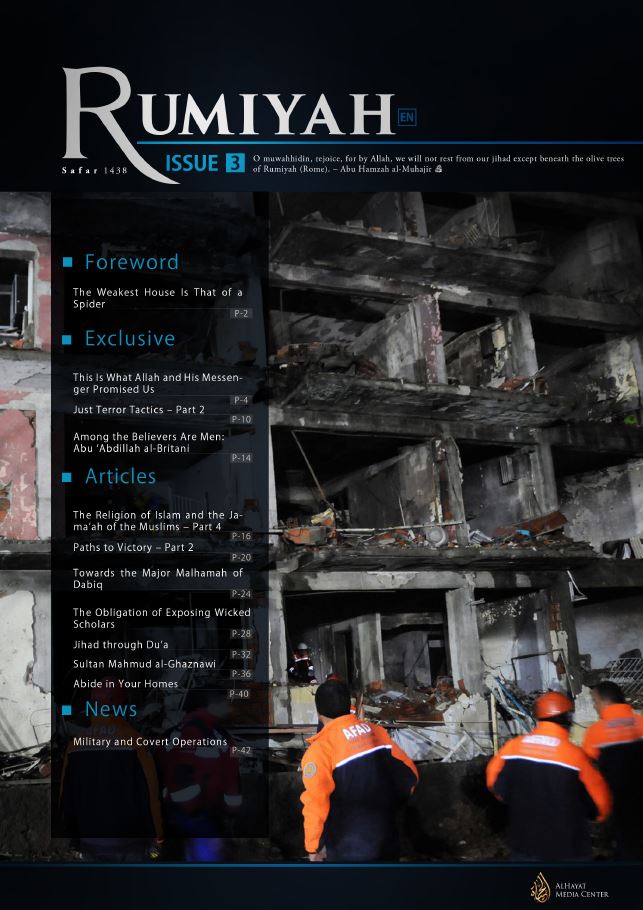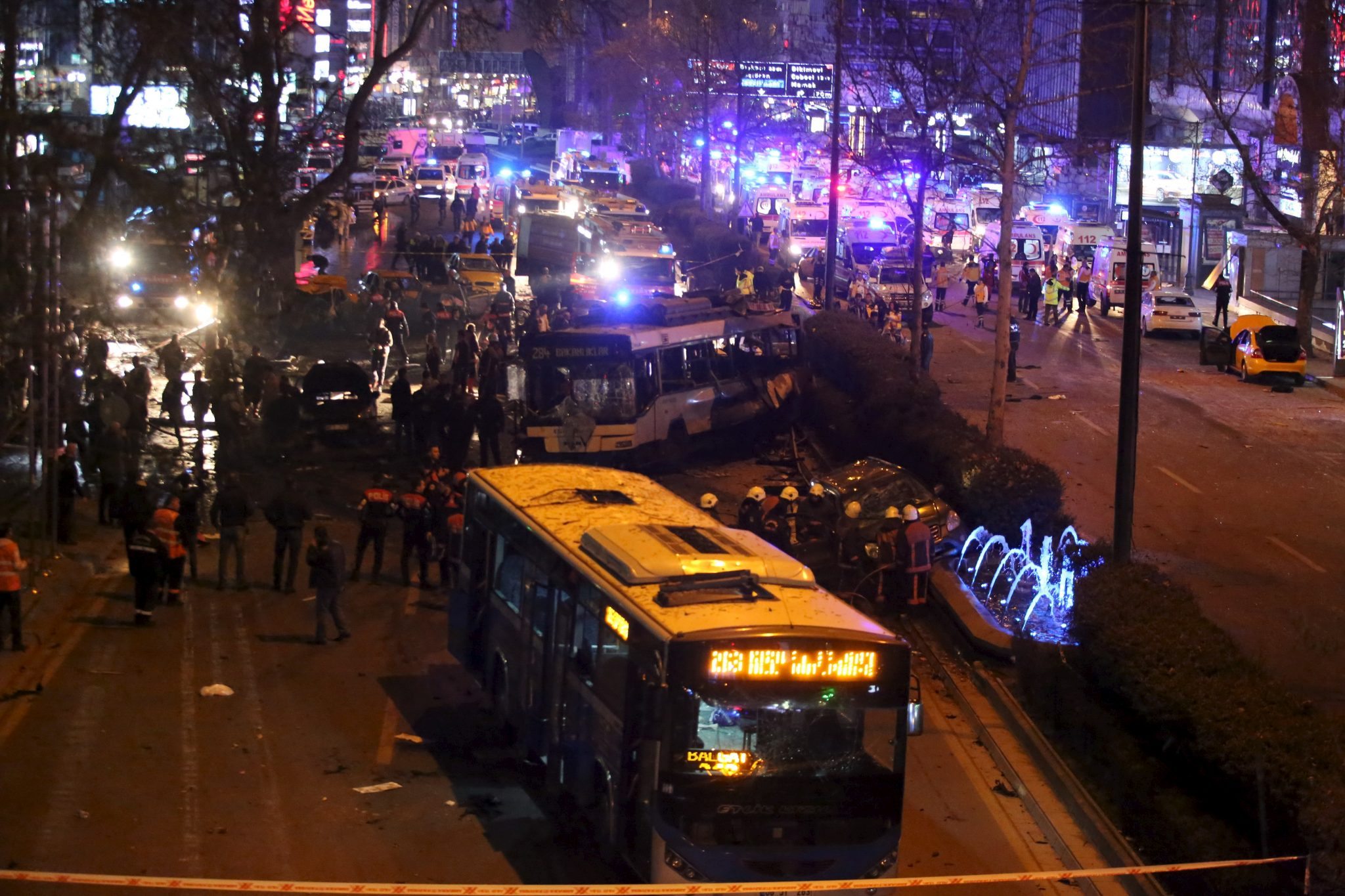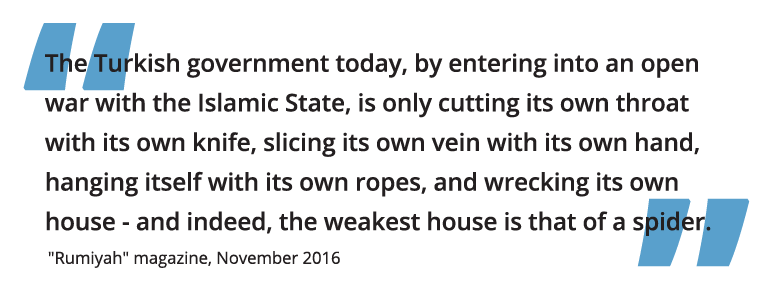Executive Summary:
- In Islamic State’s (IS) most recent publication of its self-promoting magazine, “Rumiyah,” the jihadist group calls for its followers to stage attacks against political, religious, and security entities within the Turkish state, as well as those who support the country in general.
- This edition marks a drastic shift in rhetoric as compared to previous publications, which was likely triggered by the Turkish government’s increasing involvement against IS in both Iraq and Syria, particularly as the militant group faces major setbacks in both countries.
- Due to these setbacks, IS will likely increase its recruitment efforts, while attempting to launch less sophisticated, but more frequent attacks within Turkey over the coming weeks to retaliate against the Turkish state.
- Travel to Istanbul and Ankara may continue, although travelers are advised to maintain heightened vigilance in central areas due to the threat of militancy, as well as regular anti-government protests and occasional incidents of unrest in these locales. Contact us at [email protected] or +44 20-3540-0434 for itinerary and contingency support options.
Current Situation:
- In the Islamic State’s (IS) latest publication of “Rumiyah”, the group’s self-promoting magazine which lists its political and theological stances, as well as boasts its successful acts of militancy and achievements on the battlefield, the militant group called for its followers to “strike the Turkish taghout,” referring to the Turkish state as an apostate government, and all those who support the Turkish state.
- While the militant group had written about its opposition to the Turkish government in previous issues of Rumiyah, as well as in its predecessor “Dabiq,” the jihadists’ resistance to Turkey in this most recent publication is heavily emphasized, and largely more hostile, unlike magazines in the past.
- Moreover, IS explained how Turkey had previously attempted to keep its conflict with the militant group “under wraps,” but now, Turkey’s increasing intervention has displayed that the country’s president, Recep Tayyip Erdogan, “did not heed the lessons” of other opposing nations. By increasing its operations against IS, the jihadist group claims that the Turkish government is “cutting its own throats.”
- IS lists four categories of targets for militants operating in Turkey in their most recent publication: 1) Turkish Imams, religious figures, and those who do not believe in Islam; 2) Police, judges, and the military; 3) Scholars, supporters of the ruling Justice and Development Party (AKP), and other political parties allied to it; and 4) Citizens of “crusader” nations, which are countries that oppose and battle IS.
- Finally, in light of the Turkish government allegedly “taking advantage” of IS while it has been occupied in battle, the militant group claims that the state has become “a target for IS operations” and a “priority for jihad.”
Assessments & Forecast:
IS concerns of Turkey as a substantial threat to activities dramatically rose in recent months due to increasing Turkish actions in Syria and Iraq
- This recent publication comes amidst increased involvement by Turkey against the jihadist militant group, including its backing of Syrian rebels in “Operations Euphrates Shield,” and its direct support of Sunni, Turkmen, and Kurdish Peshmerga fighters who are challenging IS in the vicinity of Iraq’s Mosul. In light of IS facing multiple setbacks in northern Syria and Iraq, the jihadist group likely perceives Turkey’s escalating involvement as a major threat, thus calling for its fighters to retaliate against the Turkish state. In this context, while previous issues of the Sunni militant group’s publication in late 2014 and early 2015 had mentioned Turkey, namely by labeling President Erdogan as an apostate, the group claimed that the Turkish government was mostly preoccupied with its own internal conflict against the Kurdistan Workers’ Party (PKK), its own political instability, and threats emanating from other leftist militant groups. Thus, in the eyes of the jihadist militants, Turkey posed a limited threat to the operations of the group. This is further evidenced by Turkey’s minimal use of airstrikes employed against the jihadist group in 2015, particularly as compared to its frequent offensive measures taken against the PKK.
- However, the militant group’s publication released in September 2015 made a notable shift from this typical rhetoric, suddenly labeling Turkey as a significant threat due to its proposed “safe zone” against IS in northern Syria. Moreover, it went on to claim that Turkey’s army remained one of the only adequate forces in NATO, largely due to US President Barack Obama’s perceived “neutering of the US military,” and the “underfunding” of militaries in other nations that make up the international military alliance. That said, the jihadist group still viewed Turkey as distracted by its own internal problems, and thus, focused less on the potential threat it posed.
- In light of this continuing downplaying of the threat Turkey presents to IS throughout past publications, the most recent issue displays a drastic change in terms of rhetoric when writing about the Turkish government. In this context, as reflected by its recently issued publications, the Sunni jihadist militant group no longer perceives the Turkish government as distracted by its own internal factors. Instead, IS focused on Turkey’s escalated measures taken towards the jihadist group, including “opening its airspace” to nations opposing IS, “opening its borders” to provide support for Kurdish troops and rebels in both northern Syria and Iraq, and ultimately “entangling its army” in both conflict zones by sending planes to target the militants’ positions and tanks to strike against the group’s controlled territories.
- This shift in focus is reflected on the ground, as IS struggles to maintain major territories, the Turkish government continues to remain heavily involved on the Bashiqa front in northern Iraq, thus reinforcing the Iraqi pro-government forces, mainly the local Sunni Arab and Kurdish forces, offensive to reclaim the city of Mosul. Also, Turkish tanks have been reported as nearly as 30 km south of the Turkish-Syrian border, thereby reinforcing rebels in their fight to retake northern Aleppo from the jihadist group. Both of these operations constitute substantial threats to the organization, therefore likely explaining IS’ shifting rhetoric in its most recent publication, and will likely lead to further threats by the jihadist group against Turkey in the days to come.
Due to setbacks and persistence of Turkish operations against it, IS likely to increase recruitment efforts in Turkey, while attempting to launch frequent yet smaller attacks in coming weeks
- In general, the threat posed by IS to Turkey has been significantly reduced in recent months. Major, multi-pronged attacks in central locales, like witnessed in Istanbul’s Ataturk International Airport on June 28, have become notably less frequent. That being said, other groups have demonstrated their capability fill this gap and carry out sophisticated attacks in central Turkish cities, as most recently highlighted by the December 10 twin bomb attacks near Istanbul’s Vodafone Arena, which was ultimately claimed by the Kurdistan Freedom Falcons (TAK). With this in mind, despite the recent declining number of militancy incidents in Turkey, the threat of large-scale militancy in such areas persists, which is now further elevated by IS’ increasing focus on targeting Turkey.
- In this context, as IS continues to lose ground, which has been the overwhelming trend in recent weeks, the group will likely fall back on its typical strategy of attempting to stage major attacks in its opponents’ rear. This has already been seen with the vehicle-borne IED attack in Diyarbakir on November 5, which an IS-linked new agency claimed was carried out by the jihadist militants themselves, although the radical Kurdistan Freedom Falcons (TAK) claimed responsibility for the same attack. Regardless of whether IS did actually carry out the attack, the claim was highly notable, as IS has refrained from claiming such incidents in Turkey, thus further underscoring the group’s stated motive in its latest publication to carry out acts of militancy. Furthermore, it is important to note that such militancy has been witnessed in the past when IS has felt increasingly pressured, likely in an attempt to project resilience. With this in mind, as IS fights to defend its final remaining strongholds in both countries, we assess that the militants will likely up the ante in the coming weeks.

- In this context, despite Turkish security forces’ relative success in mitigating the threat of attacks in major cities, IS still has the potential to launch asymmetric acts of militancy within Turkey’s territory. For one, the militants still maintain somewhat of a presence in the country’s southern provinces located closer to the Turkish-Syrian border, such as Gaziantep, Urfa, and Adana, as recent arrests of IS militants have highlighted. Also, Turkish security forces have struggled in completely sealing off the border from IS infiltrations. That said, Turkish forces’ persistent efforts against the group, domestically and externally, have reduced this threat. Additionally, following the attempted coup in July, Turkish public support has swayed dramatically in favor of President Erdogan and the AKP government, thus limiting the potential pool of recruits for IS. Moreover, due to the state of emergency taken into effect after the coup, security forces were granted greater authority to take heightened measures, thus likely leading to a reduction of militancy altogether.
- FORECAST: In light of these setbacks, IS will likely take two approaches in the coming weeks. First, the militant group will likely increase its propaganda tactics, in efforts to recruit supporters from within Turkey itself. Through means of the internet, namely social media, IS will likely seek out sympathizers in order to build its ranks, and get Turkish citizens to carry out attacks in its name. Second, due to Turkish forces’ escalated security presence, IS-linked supporters will likely aim to stage smaller, less sophisticated attacks in higher frequencies, as such are harder for security forces to detect. This will likely include shootings, as well as the use of IEDs and other explosives targeting security forces, political figures, and also civilians. Such was witnessed with the Diyarbakir attack on November 5, as the attack was a vehicle-borne IED instead of a suicide bombing or multi-pronged attack.
- Ultimately, however, the main goal of IS will be to stage a large-scale attack in a major area, particularly as the group continues to lose ground in Syria and Iraq. As IS becomes more desperate, its motivation to stage such an attack will increase. In light of precedent attacks which have proven IS capabilities to stage such acts of militancy, a sophisticated attack occurring in a major locale in the coming months remains possible in the long-term. In addition to this, a heightened focus on government-affiliated targets, particularly entities linked with the AKP, may be witnessed with such attacks given the government’s persistent operations against the militant group.
Recommendations:
- Travel to Istanbul and Ankara may continue, although travelers are advised to maintain heightened vigilance in central areas due to the threat of militancy, as well as regular anti-government protests and occasional incidents of unrest in these locales. Contact us at [email protected] or +44 20-3540-0434 for itinerary and contingency support options.
- Avoid nonessential travel to the immediate vicinities of government buildings, police stations, political party offices, popular public places and shopping centers, as well as Western institutions and places frequented by Westerners, and places of worship due to the threat of militancy.
- Avoid nonessential travel to Turkey’s southern and eastern provinces, while also avoiding all travel to border areas with Syria and Iraq, given the increased risk of militancy and spillover violence.
- Those conducting essential travel to Turkey’s southern and eastern provinces are advised to defer all travel to areas witnessing curfews due to the elevated risk of violence in these locales.

